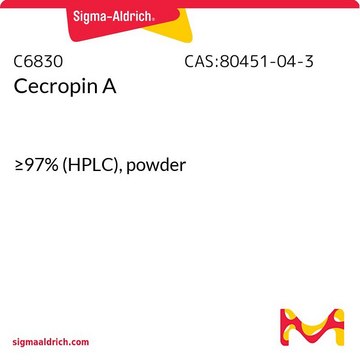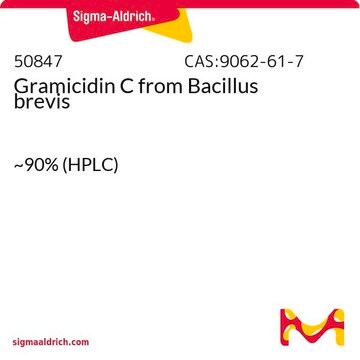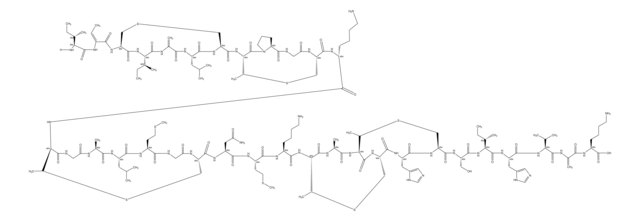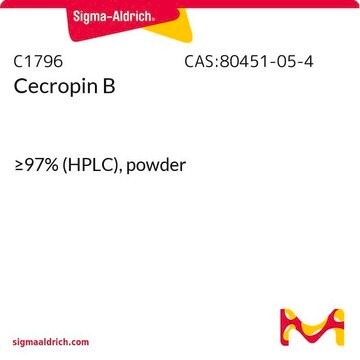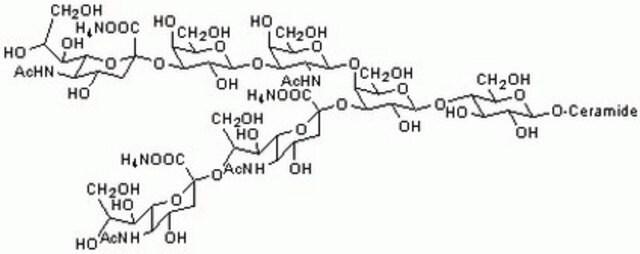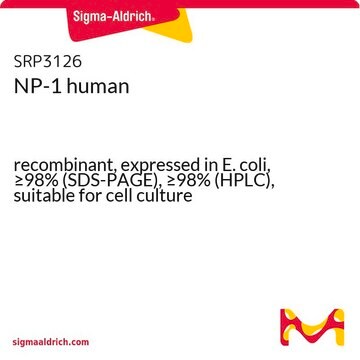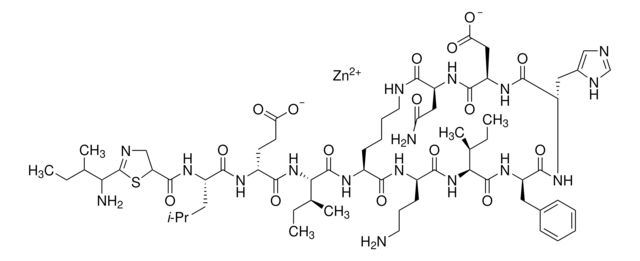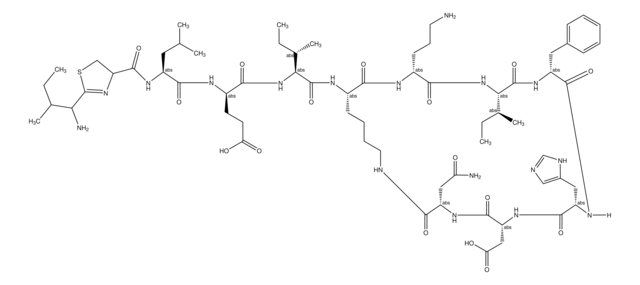B2809
Bactenecin
≥95% (HPLC)
About This Item
Empfohlene Produkte
Qualitätsniveau
Assay
≥95% (HPLC)
Form
powder
Löslichkeit
1 mg/mL (in 1% TFA in H20)
Wirkungsspektrum von Antibiotika
Gram-negative bacteria
Wirkungsweise
cell membrane | interferes
Lagertemp.
−20°C
SMILES String
CC[C@H](C)[C@@H]1NC(=O)[C@H](CCCNC(N)=N)NC(=O)[C@H](CSSC[C@H](NC(=O)[C@@H](NC(=O)[C@H](CCCNC(N)=N)NC(=O)[C@@H](NC(=O)[C@@H](NC(=O)[C@@H](NC1=O)C(C)C)C(C)C)[C@@H](C)CC)C(C)C)C(=O)N[C@@H](CCCNC(N)=N)C(O)=O)NC(=O)[C@H](CC(C)C)NC(=O)[C@@H](N)CCCNC(N)=N
InChI
1S/C63H118N24O13S2/c1-13-34(11)46-57(97)78-38(21-17-25-75-62(69)70)49(89)83-43(31(5)6)54(94)82-42(53(93)79-39(59(99)100)22-18-26-76-63(71)72)29-102-101-28-41(81-51(91)40(27-30(3)4)80-48(88)36(64)19-15-23-73-60(65)66)52(92)77-37(20-16-24-74-61(67)68)50(90)86-47(35(12)14-2)58(98)85-44(32(7)8)55(95)84-45(33(9)10)56(96)87-46/h30-47H,13-29,64H2,1-12H3,(H,77,92)(H,78,97)(H,79,93)(H,80,88)(H,81,91)(H,82,94)(H,83,89)(H,84,95)(H,85,98)(H,86,90)(H,87,96)(H,99,100)(H4,65,66,73)(H4,67,68,74)(H4,69,70,75)(H4,71,72,76)/t34-,35-,36-,37-,38-,39-,40-,41-,42-,43-,44-,45-,46-,47-/m0/s1
InChIKey
RHISNKCGUDDGEG-CJMCYECYSA-N
Amino Acid Sequence
Allgemeine Beschreibung
Anwendung
Biochem./physiol. Wirkung
Sonstige Hinweise
Lagerklassenschlüssel
11 - Combustible Solids
WGK
WGK 3
Flammpunkt (°F)
Not applicable
Flammpunkt (°C)
Not applicable
Persönliche Schutzausrüstung
Eyeshields, Gloves, type N95 (US)
Analysenzertifikate (COA)
Suchen Sie nach Analysenzertifikate (COA), indem Sie die Lot-/Chargennummer des Produkts eingeben. Lot- und Chargennummern sind auf dem Produktetikett hinter den Wörtern ‘Lot’ oder ‘Batch’ (Lot oder Charge) zu finden.
Besitzen Sie dieses Produkt bereits?
In der Dokumentenbibliothek finden Sie die Dokumentation zu den Produkten, die Sie kürzlich erworben haben.
Kunden haben sich ebenfalls angesehen
Unser Team von Wissenschaftlern verfügt über Erfahrung in allen Forschungsbereichen einschließlich Life Science, Materialwissenschaften, chemischer Synthese, Chromatographie, Analytik und vielen mehr..
Setzen Sie sich mit dem technischen Dienst in Verbindung.